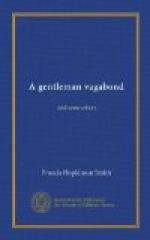In three or four weeks he was about again, dragging the leg when he walked. He could still get around the shanty and over to the grocer’s, but he could not climb the hill, even with the pail empty. He tried one day, but he only climbed half way. Sanders found him in the path when he went home, lying down by the pail.
Sanders worried over the dog. He missed the long talks at the crossing over the dinner, the poor fellow sitting by his side watching every spoonful, his eyes glistening, the old ear furling and unfurling like a toy flag. He missed, too, his scampering after the sparrows and pigeons that often braved the desolation and smoke of this inferno to pick up the droppings from the carts. He missed more than all the companionship,—somebody to sit beside him.
As for the girl—there was now a double bond between her and the dog. He was not only poor and an outcast, but a cripple like herself. Before, she was his friend, now, she was his mother, whispering to him, her cheek to his; holding him up to the window to see the trains rush by, his nose touching the glass, his poor leg dangling.
The train hands missed him too, vowing vengeance, and the fireman of No. 6, Joe Connors, spent half a Sunday trying to find the boy that threw the stone. Bill Adams, who ran the yard engine, went all the way home the next day after the accident for a bottle of horse liniment, and left it at the shanty, and said he’d get the doctor at the next station if Sanders wanted.
One broiling hot August day—a day when the grasshoppers sang among the weeds in the open lot, and the tar dripped down from the roofs, when the teams strained up the hill reeking with sweat, a wet sponge over their eyes, and the drivers walked beside their carts mopping their necks—on one of these steaming August days the dog limped down to the crossing just to rub his nose once against Sanders as he stood waving his flag, or to look wistfully up into his face as he sat in the little pepper-box of a house that sheltered his flags and lantern. He did not often come now. They were making up the local freight—the yard engine backing and shunting the cars into line. Bill Adams was at the throttle and Connors was firing. A few yards below Sanders’s sentry-box stood an empty flat car on a siding. It threw a grateful shade over the hard cinder-covered tracks. The dog had crawled beneath its trucks and lay asleep, his stiffened leg over the switch frog. Adams’s yard engine puffing by woke him with a start. There was a struggle, a yell of pain, and the dog fell over on his back, his useless leg fast in the frog. Sanders heard the cry of agony, threw down his flag, bounded over the cross-ties, and crawled beneath the trucks. The dog’s cries stopped. But the leg was fast. In a moment more he had rushed back to his box, caught up a crowbar, and was forcing the joint. It did not give an inch. There was but one thing left—to throw the switch




